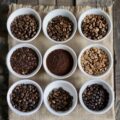The Importance of Fresh Beans
One of the fundamental aspects of brewing a perfect cup of coffee is starting with fresh beans. Freshly roasted beans significantly affect the flavor and aroma of your coffee. To ensure you’re getting the freshest beans, buy from a local roaster or a reputable source, and check the roast date on the packaging. Ideally, use the beans within two to three weeks of the roast date.
Grinding Your Coffee
Grinding your coffee just before brewing is another critical step in the coffee-making process. Coffee begins to lose its flavor and aroma immediately after grinding, so it’s best to grind only what you need for each brew. Additionally, the grind size should match your brewing method. For example, use a coarse grind for French press, a medium grind for drip coffee makers, and a fine grind for espresso machines.
Water Quality and Temperature
The quality and temperature of your water play crucial roles in the brewing process. Use filtered water to avoid any off-flavors from chlorine or other contaminants. The ideal water temperature for brewing coffee is between 195°F and 205°F. Water that is too hot can over-extract the coffee, making it bitter, while water that is too cool can under-extract, resulting in a weak and sour taste.
Measuring Your Coffee
Accurate measurements are essential for consistency and achieving the perfect balance of flavors. The general guideline is to use one to two tablespoons of coffee per six ounces of water, but you can adjust this ratio to suit your taste preferences. Using a kitchen scale to measure your coffee and water can help you achieve more precise and consistent results.
Brewing Techniques
There are various brewing techniques, each offering a unique flavor profile and experience. Here are a few popular methods:
- Pour-over: This method involves pouring hot water over coffee grounds in a filter, allowing the water to drip through into a carafe or mug. It offers excellent control over the brewing process and results in a clean, flavorful cup.
- French press: In this method, coffee grounds are steeped in hot water for several minutes before being separated by pressing a plunger through a mesh filter. This results in a full-bodied and rich cup of coffee.
- AeroPress: This versatile and portable device uses air pressure to push hot water through coffee grounds, resulting in a smooth and concentrated brew. It’s perfect for those who enjoy experimenting with different brewing variables.
- Espresso: This method uses high pressure to force hot water through finely-ground coffee, producing a strong and concentrated shot. Espresso is the base for many popular coffee drinks, such as lattes and cappuccinos.
Storing Your Coffee
Proper storage of your coffee beans is essential to maintaining their freshness and flavor. Store your beans in an airtight container away from light, heat, and moisture. Avoid keeping them in the refrigerator or freezer, as this can introduce moisture and affect the flavor. Instead, store them in a cool, dark place, such as a pantry or cupboard.
FAQ
1. How can I tell if my coffee beans are fresh?
Fresh coffee beans will have a rich aroma and a glossy appearance due to the natural oils present on the surface. Stale beans, on the other hand, will have a dull appearance and lack a strong aroma. Always check the roast date on the packaging and aim to use the beans within two to three weeks of the roast date for optimal freshness.
2. What type of grinder should I use?
A burr grinder is the best option for grinding coffee beans, as it provides a consistent grind size and allows for precise control over the grind settings. Blade grinders, while more affordable, tend to produce uneven grind sizes, which can negatively impact the flavor of your coffee.
3. How important is water quality in brewing coffee?
Water quality is extremely important in brewing coffee, as it makes up about 98% of the final beverage. Using filtered water helps remove impurities that can affect the taste of your coffee. Avoid using distilled water, as it can result in a flat and uninteresting flavor.
4. Can I reuse coffee grounds?
It’s not recommended to reuse coffee grounds, as the initial brewing process extracts most of the desirable flavors and aromas. Reusing grounds will result in a weak and bitter cup of coffee. Instead, consider using spent coffee grounds for gardening or composting.
5. What is the best way to clean my coffee equipment?
Regular cleaning of your coffee equipment is essential to maintain the quality and flavor of your brews. For drip coffee makers, run a mixture of equal parts water and white vinegar through the machine, followed by several cycles of clean water to rinse. For French presses and AeroPress, disassemble the parts and wash them with warm, soapy water. For espresso machines, follow the manufacturer’s instructions for descaling and cleaning.









